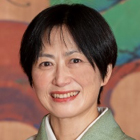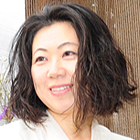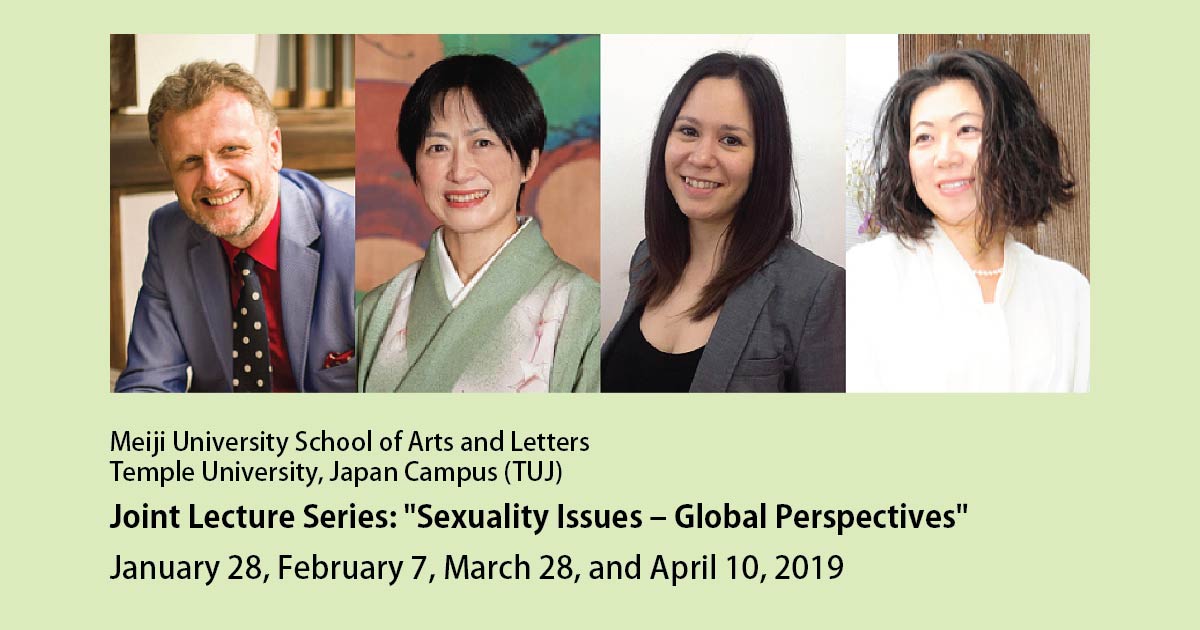Temple University, Japan Campus (TUJ) and Meiji University School of Arts and Letters in Tokyo are offering a first-of-its-kind joint lecture series entitled “Sexuality Issues — Global Perspectives.” Research presented covers topics including clinical, psychological, sociological, anthropological and cross-cultural perspectives on human sexuality. This first series features speakers from TUJ and Meiji University, and a guest speaker from International Christian University.
Sexuality research in Japan is minimal or nonexistent in many academic fields. Sexual well-being is often ignored or marginalized, even within medicine, psychology and psychotherapy. And sexuality issues are rarely discussed even in Gender Studies. So gender discrimination against women is particularly remained. There is little support for social discussion of sexuality, and the general public’s awareness of issues remains low.
During the process of westernization and modernization in Japan, many Western sexual norms were accepted. And Japan’s male-dominated social structure makes open discourse within academic circles difficult and creates obstacles to conducting sexuality research.
Researchers from TUJ and Meiji University believe that this series of lectures is an important step to building public awareness of sexuality in Japan.
Co-hosted by: Temple University, Japan Campus / Meiji University School of Arts and Letters


In collaboration with: International Christian University

Speakers and Lecture Titles

Vol. 1: “The Introduction to Sexology and Couples Sexual Problems and Clinical Interventions”
Dariusz Skowronski, TUJ
Monday, January 28, 2019 [This event has passed]
Venue: Meiji University, Surugadai Campus
The presentation introduces the modern approaches to human sexuality and clinical sexology, based on interdisciplinary and comprehensive perspectives on psychological, medical, social and cultural aspects of sexual expressions. The presentation focuses on the assessment and treatment of couples’ sexual issues and offers an outline of clinical interventions offered in the clinical sexology field, as well as modern counseling approaches used to improve sexual well-being.
Dariusz P. Skowronski (PhD), Psychologist & Clinical Sexologist
Dariusz P. Skowronski is an assistant professor in Psychological Studies at Temple University, Japan Campus. He teaches Human Sexuality, Clinical Sexology in the Japanese Context, and other psychology courses. He is also a psychotherapist specializing in clinical sexology and sexual therapy. He trained in Poland and Australia and is available for face-to-face counseling in the Tokyo area, and offers video-based online counseling as well.
His fields of academic and clinical expertise include a wide range of marital, relationship, gender, and sexuality issues, sex education and sexual development, sexual health and satisfaction, sexual disorders, sexual addictive behaviors and sexual abuse. Skowronski also works in the area of cross-cultural psychology with a special emphasis on international couples and marriages.
Dariusz P. Skowronski obtained his PhD in Social and Behavioral Sciences from Adam Mickiewicz University, Poland in 2002, and completed postgraduate work on gender and human sexuality with the Polish Sexological Society, Warsaw. Skowronski was a faculty member in the Sexual Health graduate program at The University of Sydney from 2005-2008 and collaborated closely with the Australian Society of Sex Educators, Researchers and Therapists, New South Wales. He also taught psychology at Temasek Polytechnic in Singapore, as well as at Waseda University and Sophia University in Tokyo. The Australian Psychological Society recognized his psychology qualifications, and currently he is a member of the National Council of Psychotherapists (United Kingdom), the Polish Sexological Society, and the Japan Association of Family Therapy.

Vol. 2: “The Customs and the Universe of Meaning of Japanese Sexuality Before the Era of Modernization and Westernization”
Maki Hirayama, Meiji University
Thursday, February 7, 2019
Venue: TUJ, Azabu Hall, The Parliament Student lounge (Access)
Before modernization and Westernization in Japan, sexual customs such as an orgy on festival nights were common and popular features of Japanese culture. The lecturer talks about a variety of sexual customs, focusing on various time periods, geographical locations, and social classes.The lecturer also focuses on the meanings of these customs, with reference to religion, family systems, and community relationships.
Maki Hirayama (M.A), Sociologist
Maki Hirayama is an associate professor at School of Arts and Letters, Meiji University, teaching Sociology of Gender and Sexuality, Sociology of Body and Body Culture and Family Studies. Her recent research focuses on modern and historical Japanese sexualities with comparative view. Sexual activities have been depressed, while academic sexuality studies have been undeveloped in this country. So as to change the situation, she organizes a multi-disciplinary research group on sexuality, and leads or participate in various projects such as research on modern history of sexualities,a survey on sexual function of the Japanese women, the research on sexual happiness of the Japanese people, and so on.
In 1990s and 2000s, Maki Hirayama focused on two research topics. One was the transition of mother-child bond, as seen in her book “The Transition and Future of Maternal Society Japan (Bosei Shakai no Yukue)” in 2010. The other was the change of body culture in the internet age. She played a main part in establishing a new course for education and research on body culture in Edogawa University. While studying these topics she was able to gain a broad view that was sufficient to analyze Japanese sexualities which are quite different from Western ones. She is familiar with the practices of body and performing arts, especially Noh and Tea, and also teaches Japanese Body Culture at Tsukuba University, Graduate School of International and Advanced Japanese Studies.
She obtained her B.A in Sociology and M.A in interdisciplinary social sciences from University of Tokyo. She is a member of The Japan Sociological Society, International Sociological Association, and other societies.

Vol. 3: “An Exploration of (No) Sexual Intimacy in Contemporary Japan and German-speaking Countries: Introducing Interview Results about Sexless Couples”
Alice Pacher, Meiji University
Thursday, March 28, 2019
Venue: TUJ, Azabu Hall, The Parliament Student lounge (Access)
The beginning of the twenty-first century is marked by a particular discourse on sexuality within couple relationships, a discourse which emerged in the West and which includes beliefs that sex is an important value for building intimacy and bonding for seeking pleasure, and for recreation. However in Japan people who do not desire any sexual intercourse with their spouses are defining characteristics of Japanese couple relationships in contemporary society.
This presentation shows the results of interviews with Japanese men and women compared with interview results of men and women from German-speaking countries. Comparison highlight how sexual contexts, especially sexlessness, are portrayed differently in the respective societies.
5Alice L. Pacher (Doctoral Candidate)
Alice L. Pacher is a doctoral candidate and research assistant in the Department of Clinical Psycho-social Science at Meiji University in Tokyo. She teaches an elective lecture, “thinking about love relationships with Alice” which focuses on current issues of love and sexuality among Japanese students. She is also a lecturer in German communication and a lecturer at the Association for Promotion of International Understanding (APIU).
Her research focuses on Japanese couple relationships (married and unmarried) in contemporary times with a particular emphasis on sexual behavior and sexual consciousness. Using a sociological perspective, her work has uncovered novel insights into the sexless phenomenon and extramarital affairs in contemporary Japan. Pacher also studies cross-cultural sexuality with a special emphasis on comparisons of Austrian, German and Japanese sexual awareness.
Alice L. Pacher completed her master’s degree at Meiji University in 2014 and her bachelor’s at the University of Vienna, Austria in 2011. In 2018 she received a Jinnai Ryoichi award for engagement in Japanese schools.
Pacher is currently a member of the World Association for Sexual Health (WAS) and the Asia Oceania Federation for Sexology (AOFS). Her most recent publication is “Sexlessness Among Contemporary Japanese Couples,” Beniwal A., Jain R., Spracklen K. (eds) in Leisure Studies in a Global Era – Global Leisure and the Struggles for a Better World, (Palgrave Macmillan, 2018).

Vol. 4: “Kawanoji-sleeping Practice and Sexuality in the Japanese Families”
Yoshie Moriki, International Christian University
Wednesday, April 10, 2019
Venue: Meiji University, Surugadai Campus (Access)
The presentation will focus on the relationships between kawanoji sleeping arrangements and women’s sexuality in Japanese families. Japanese women strongly internalize their roles as “mother,” a role that is socially seen as non-sexual, and she is expected to behave as such. Sexless marriages in Japan, sexuality, and parenting are explored.
Yoshie Moriki (PhD), Anthropologist & Demographer
Yoshie Moriki is a senior associate professor at International Christian University (ICU). She obtained her MA in 1999 and a PhD in 2007, both from Pennsylvania State University, USA, after graduating from Tokyo Woman’s Christian University, Japan in 1997. She is an anthropological demographer; her academic training is in cultural anthropology and demography, specializing in Thailand and Japan. Her research interests are the relationships between demographic dynamics and culture, including such issues as living arrangements of the elderly in Bangkok and sexless marriages in Japan. She uses both quantitative and qualitative methods. As a demographer, she uses large scale population-based data; as an anthropologist she uses ethnographic techniques such as participant observations, face-to-face interviews, and focus group discussions.
Moriki has worked for the United Nations Economic and Social Commission in Asia and the Pacific (ESCAP) in Bangkok, Thailand; and for the Nihon University Population Research Institute (NUPRI), Tokyo, before joining the ICU faculty. She currently teaches a range of anthropology courses, including field-based ethnographic courses and a graduate course. Her recent publications focus on the issue of sexless marriages and their implications for low fertility in Japan. She also has been exploring the meaning of intimacy and the concept of marriage in Japan.

